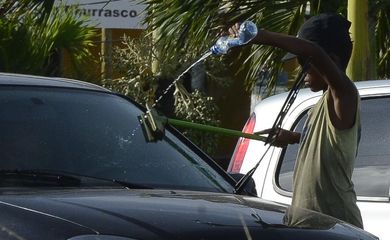In northeastern Brazil, prosecutors work to prevent child labor




Child labor found in free markets in Quipapá (in Pernambuco)
Children and adolescents are frequently found working in markets and slaughterhouses in municipalities of wild Pernambuco. This fact led the Ministry of Labor to file civil class actions against 13 municipalities of the region, which refused to sign a Conduct Adjustment Term to eradicate child labor.
According to prosecutor José Adílson Pereira da Costa, responsible for the case, the most grave situation is reported in slaughterhouses where minors are responsible for tasks like cutting viscera and catching animals' blood. "It's a very painful task, not every adult can do it. Imagine it for children. "
However, according to Costa, in free markets we find the most frequent labor and the most difficult labor to combat, which is children and adolescents carrying customers' shopping in wheelbarrows, which is called "freight."
"In these cases, the child works for society, not for a specific employer," explains the prosecutor. When children are taken by their parents who usually also work in the market, it is easier to identify the person responsible for the illegal labor, but many of them are there alone, which hinders the oversight operation. Children in this activity are on average aged 12 and 13 years, according to the prosecutor, but the Ministry of Labor already found 10-year-old children carrying customers' shopping in wheelbarrows. "Often children carry more weight than their own body weight," he declared.
Law forbids it
Under Brazilian law, children under 16 are prohibited to work. They are only allowed to participate in apprenticeship programs from 14 years old. The law also forbids their work "in places, where their professional training, and their physical, mental, moral and social development may be harmed. They are also forbidden to attend working hours and places that do not permit their school attendance."
In addition, Brazil also ratified Convention 182 of the International Labour Organization (ILO), which establishes the worst forms of child labor and actions to remove children from it. “Just to begin mentioning, because of the weight carried, the sunny conditions, the accident risk, the task of carrying shopping is prohibited for children under 18 years old, for the load weight and unhealthy conditions," said the prosecutor.
An argument often used by families is that the child needs to learn the task to get a job in the future and help pay household bills as soon as possible. But, in Costa's view, this habit has the opposite effect. "The child who works since early years repeats the cycle of poverty and will repeat it again with their family. They will have poor school performance, they will not be able to hold good positions in the labor market. The cycle can only be broken with a minimal support for families so that children do not have to work."
Agência Brasil tried to talk to autorithies from the 13 municipalities aforementioned in the report, but none of them have answered.
Translated by Amarílis Anchieta
Fonte: In northeastern Brazil, prosecutors work to prevent child labor



